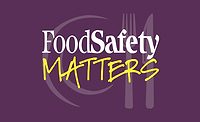Ep. 5. John Spink: "We'll never arrest our way to food protection"

Dr. John Spink is the director of the Food Fraud Initiative at Michigan State University (MSU). Over the years, John's research has focused on economically motivated food adulteration, including the use of adulterant substances, counterfeit products, stolen goods, smuggled goods, tampering and intentional mislabeling. His leadership positions include product fraud related activities with the International Organization for Standardization, Global Food Safety Initiative's (GFSI's) Food Fraud Think Tank, and U.S. Pharmacopeia.
John's global activities include engagements with the European Commission, INTERPOL and Operation Opson, New Zealand Ministry for Primary Industries. He also serves as the advisor on food fraud to the Chinese National Center for Food Safety Risk Assessment. John's outreach includes MSU’s biannual Food Fraud Massive Open Online Course that offers free training and certificates online.
In addition to John's many involvements throughout the food industry, he is also a frequent contributor to Food Safety Magazine.
Listen here and subscribe on Apple Podcasts | Stitcher | Google Play | Android
In this episode of Food Safety Matters, we speak to John Spink about:
- MSU's work in studying how companies and governments make decisions related to food
- Food safety vs. food fraud and why these two entities deserve to be looked at separately
- Why food fraud prevention is more important than simply discovering new cases of food fraud
- The many different types of food fraud and how criminals are getting even more sophisticated with their methods
- The Food Safety Modernization Act: where food fraud fits in, and where it doesn't
- Sudan red, melamine, horse meat and how these food fraud cases have brought the problem to the forefront
- Upcoming regulations and requirements for companies who want to be GFSI-compliant
- The Codex Alimentarius global food code
- How criminology, consumer behavior and other disciplines play a role in food fraud prevention
John Spink's Articles Published in Food Safety Magazine
Food Fraud Vulnerability Assessment and Prefilter for FSMA, GFSI and SOX Requirements (Feb/March 2017)
Economically Motivated Adulteration: Broadening the Focus on Food Fraud (Aug/Sep 2014)
COVER STORY: Economically Motivated Adulteration: Another Dimension of the Expanding Umbrella of Food Defense (Oct/Nov 2013)
Related Content:
MSU Joins Codex for New Food Fraud Undertaking
IUFoST Bulletin Examines Worldwide Food Fraud Problem
Trends and Solutions in Combating Global Food Fraud
The Food Safety Challenge of the Global Food Supply Chain
About Don Schaffner
Dr. Donald W. Schaffner is Distinguished Professor and Extension Specialist in Food Science at Rutgers University. He has published over 150 peer reviews papers on a variety of topics including handwashing, cross-contamination, quantitative microbial risk assessment and predictive food microbiology. Dr. Schaffner has served on a variety of national and international expert committees, including service to U.S. National Academy of Sciences and the World Health Organization and Food and Agriculture Organization. He is active in several scientific associations including the International Association for Food Protection where he is a past-president. He holds a B.S. in Food Science from Cornell University and a M.S. and Ph.D. in Food Science and Technology from the University of Georgia. Don co-hosts a podcast—Food Safety Talk—on microbial food safety.
Resources Mentioned in This Episode
Congressional Research Service on Food Fraud (included Food Protection Risk Matrix)
GFSI White Paper: Position Paper on Mitigating the Public Health Risk of Food Fraud
SSAFE
Codex Alimentarius
Handwashing: Cool Water as Effective as Hot for Removing Germs
Quantifying the Effects of Water Temperature, Soap Volume, Lather Time, and Antimicrobial Soap as Variables in the Removal of Escherichia coli ATTC 11229 from Hands
Would you like to tell us what you think about Food Safety Matters so far? Do you have a suggestion on who we should interview? Are there hot topics you'd like us to cover? Email us at podcast@food-safety.com.
Looking for a reprint of this article?
From high-res PDFs to custom plaques, order your copy today!



